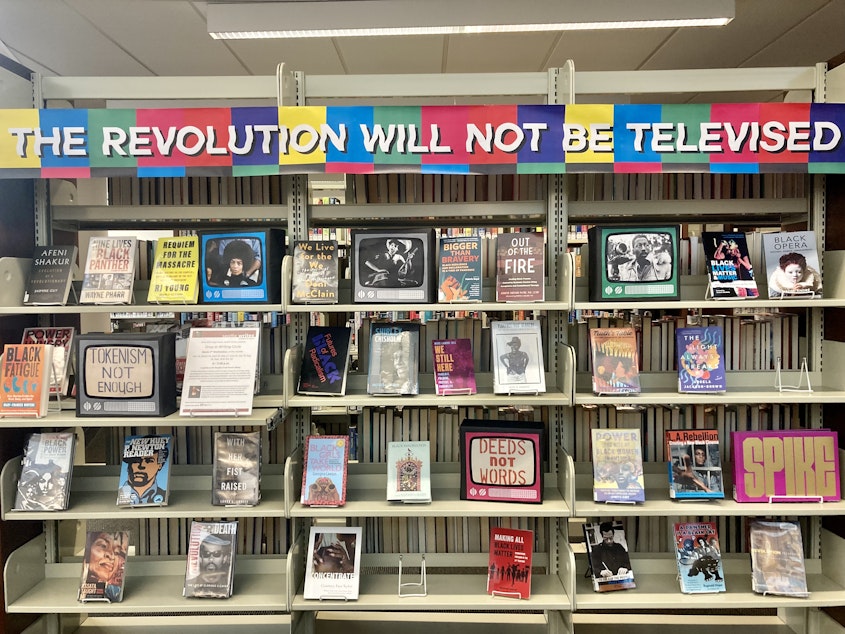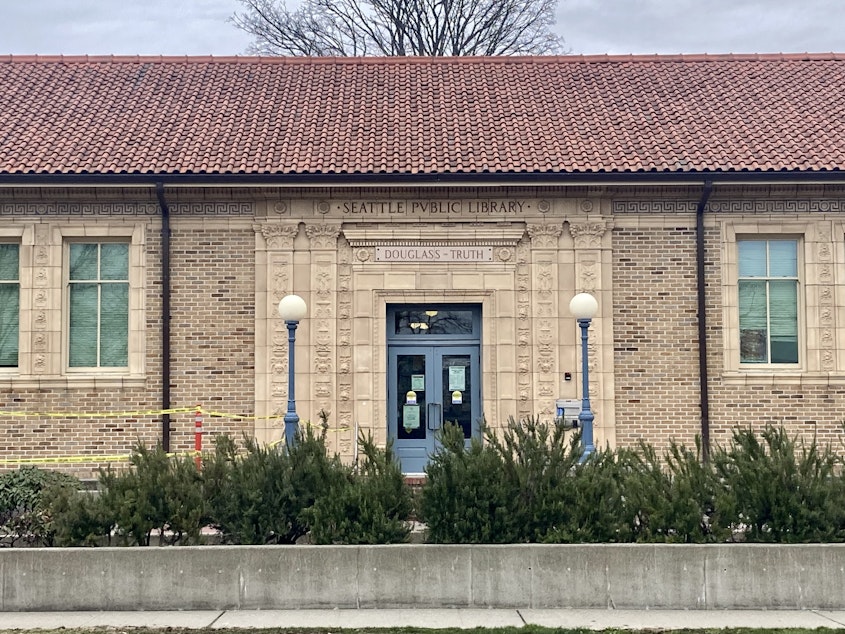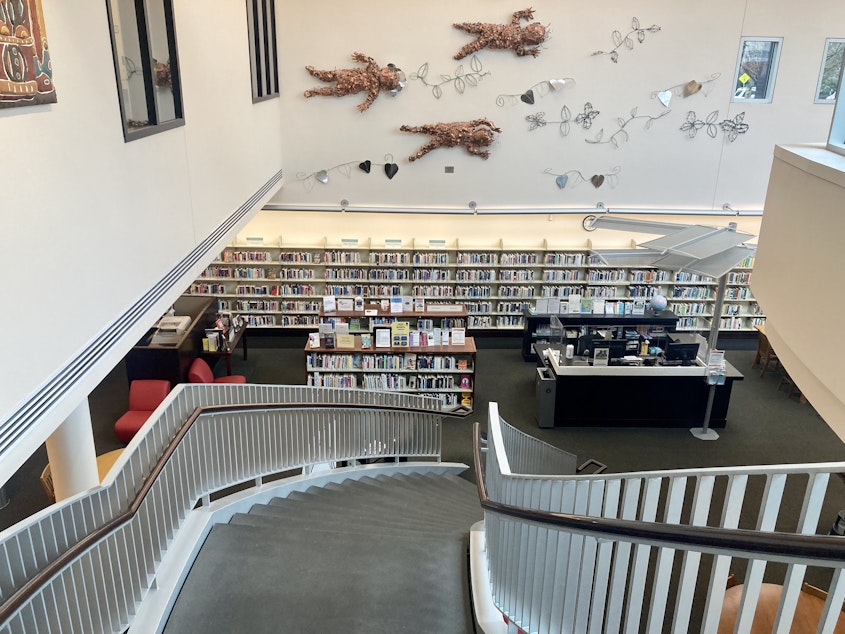Celebrate Black literature and history all year long at Seattle Public Library's Douglass-Truth Branch

Black History Month may be coming to an end, but you can enjoy the works of Black authors, poets, and novelists all year long right here in Seattle.
That's because the city is home to what some may consider a hidden treasure at the Douglass-Truth Branch of the Seattle Public Library: one of the largest collections of African-American literature and history on the West Coast.
The collection is housed in the warm brick library building, which welcomes patrons from the corner of 23rd Avenue and East Yesler Way in Seattle's Central District.
The branch was originally named for Henry Yesler, but was renamed in 1975 to honor Black abolitionists Frederick Douglass and Sojourner Truth. The collection, though, dates back to 1965, when members of the local chapter of the Black sorority Alpha Kappa Alpha and community leaders began to build the collection, which now contains more than 10,000 items.
"This is ranging from books to art prints...newspaper clippings and even dissertations from folks in the community, the focus of this being African-American culture and history," said Taylor Brooks, the African-American collection and community engagement librarian at the Douglass-Truth Branch.

A number of these materials are out on the library shelves for the community to enjoy, including special items like bound copies of EBONY and Jet magazine dating back to the 1960s. Others are tucked away, Brooks said, waiting to be unveiled to the public once again.
Sponsored
It's an extensive collection, to say the least. Even Brooks, who has only been on the job for about 10 months now, hasn't made her way through much of it. Still, her expertise makes her especially qualified to recommend literature, poetry, and non-fiction for Black History Month — and, really, all year round.
Now may be an especially important moment to highlight these works, she said.
"I have seen those assaults on our history — not just Black history, American history," Brooks said, referring to Florida Gov. Ron DeSantis' attacks on African-American studies, among others. "I think it's so important that...these authors and creators and artists continue to create, and to write, and to build, because we don't want our history to be thrown into the dustbin. We want to be able to look back, just as much as we look forward and have that inform the way that we...continue to fight for justice."
In that way, the collection Brooks champions each day has become not only a treasure but also a privilege to the people of Seattle.
"There are people who aren't able to [access these materials], or aren't able to easily do that in schools," she said. "That really sticks with me. I'm hoping that...we are able to really enjoy and celebrate our history — all of our history, the entirety of it."
Sponsored
Check out Brooks' book recommendations below and at your local library branch.

"The Study of Human Life" by Joshua Bennett
Brooks has been a fan of poet Joshua Bennett since his YouTube days, when he performed pieces like his "16 Bars for Kendrick Lamar." Since then, he's won numerous professional accolades and continues to win a spot of Brooks' list of recommendations.
His latest book of poetry, "The Study of Human Life," reflects on a variety topics, from the dreams of children to the fictional resurrection of Malcolm X, and concluding with the author's experience as a father.
Sponsored
"It gives me chills just to think about it," Brooks said.
From Penguin Random House's description of the book: "Across three sequences, Joshua Bennett’s new book recalls and reimagines social worlds almost but not entirely lost, all while gesturing toward the ones we are building even now, in the midst of a state of emergency, together."
"Relations: An Anthology of African and Diaspora Voices" by Nana Ekua Brew-Hammond
Brooks described "Relations" as "moving and thoughtful," a powerful collection of "poetry, essays, and short stories written by folks in Ghana, folks in Brazil, all over the world."
Sponsored
Nana Ekua Brew-Hammond sets out to bring people in the diaspora closer together. Brooks said the book accomplishes that in seeking out connection wherever the reader can find it.
From HarperCollins Publishers' description of the book: "New and established storytellers reshape the narratives that divide and subjugate, revealing the truth of our shared humanity despite differences in language, identity, class, gender, and beyond."
"The Other Black Girl" by Zakiya Dalila Harris
"The Other Black Girl" is quite simply Brooks' "ideal book."
She describes is as a "Jordan Peele-esque" book — referring to the writer and director of "Get Out," "Us" and "Nope" — in that it tackles themes of race and racism through a thriller lens.
Sponsored
"[It] really is able to kind of blend that social commentary throughout in a way that still engages the reader without being overly preachy," Brooks said. "Even if you aren't having these sort of [race or gender] ties to it personally, we all can take something from it, whether that be your actual identities... or being able to reflect and saying, 'I wonder how many people I know have experienced things like this.'"
From Simon & Schuster's description of the book: "Twenty-six-year-old editorial assistant Nella Rogers is tired of being the only Black employee at Wagner Books. Fed up with the isolation and microaggressions, she’s thrilled when Harlem-born and bred Hazel starts working in the cubicle beside hers. They’ve only just started comparing natural hair care regimens, though, when a string of uncomfortable events elevates Hazel to Office Darling, and Nella is left in the dust.
Then the notes begin to appear on Nella’s desk: LEAVE WAGNER. NOW."
"Digital Black Feminism" by Catherine Knight Steele
This is Brooks' top non-fiction pick at the moment.
In a way, it feels like a continuation of the early work of the Alpha Kappa Alpha members who started the Douglass-Truth Branch's extensive African-American collection. Catherine Knight Steele aims to draw a through-line from the writing of early 20th century Black women to the modern media mavens and Black feminist writers of the 21st century.
From the NYU Press description of the book: "Black women are at the forefront of some of this century’s most important discussions about technology: trolling, online harassment, algorithmic bias, and influencer culture. But, Catherine Knight Steele argues that Black women’s relationship to technology began long before the advent of Twitter or Instagram."
"find her. keep her." by Renaada Williams
Brooks cannot say enough about this book of poetry.
"I personally love how raw and how honest her poetry is," she said of Williams, the poet. "It makes me want to write every time I read it...and I want to reflect on my own experiences and emotions I may have been neglecting or need to really confront."
From Simon & Schuster's description of the book: "Renaada Williams beckons readers into her deepest thoughts and most intimate experiences as a queer Black woman living in America with her latest collection of poetry. Much like her first book, Williams presents themes like sexuality and acceptance through her stunningly arranged words, but this time she dives much deeper. find her. keep her. delivers an amplitude of emotion and rawness; reading her poetry feels as if you’ve stumbled upon her secret journal and are reading words that were never meant to be found."





